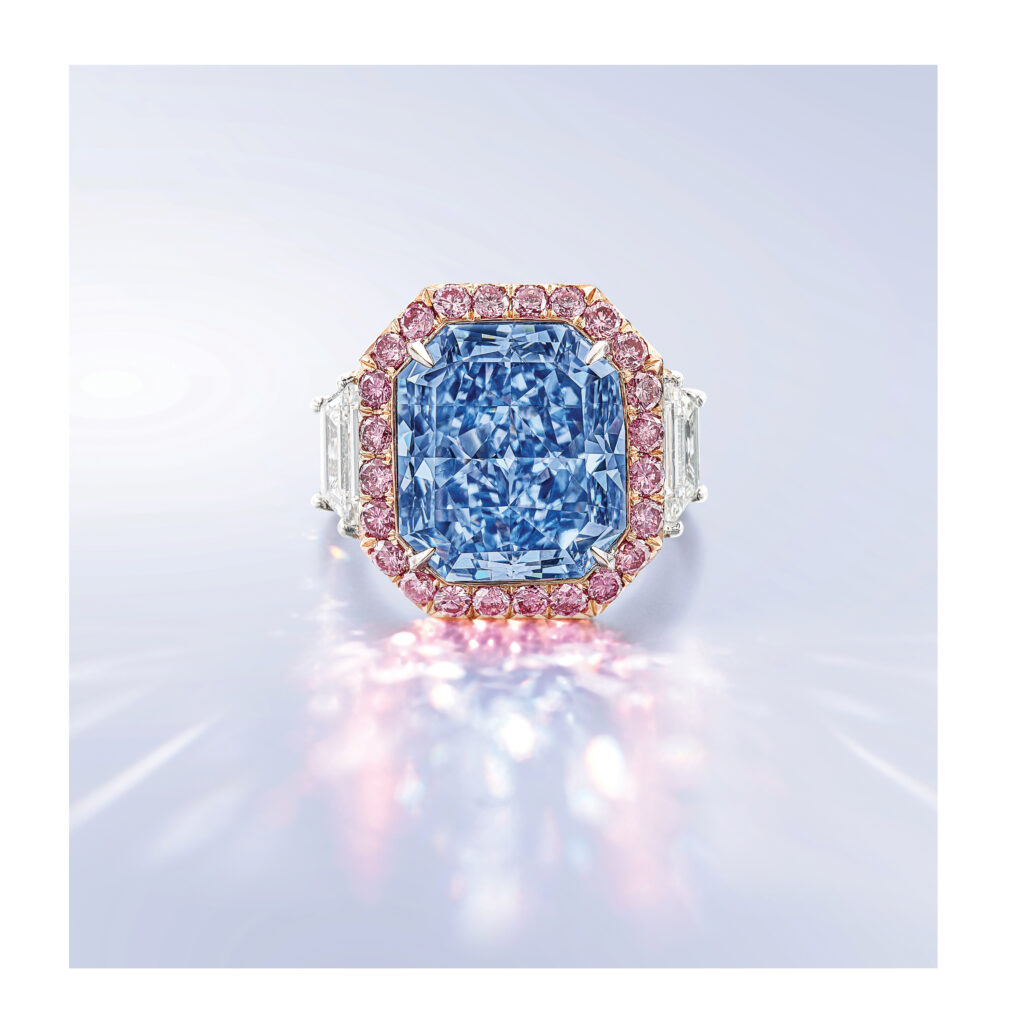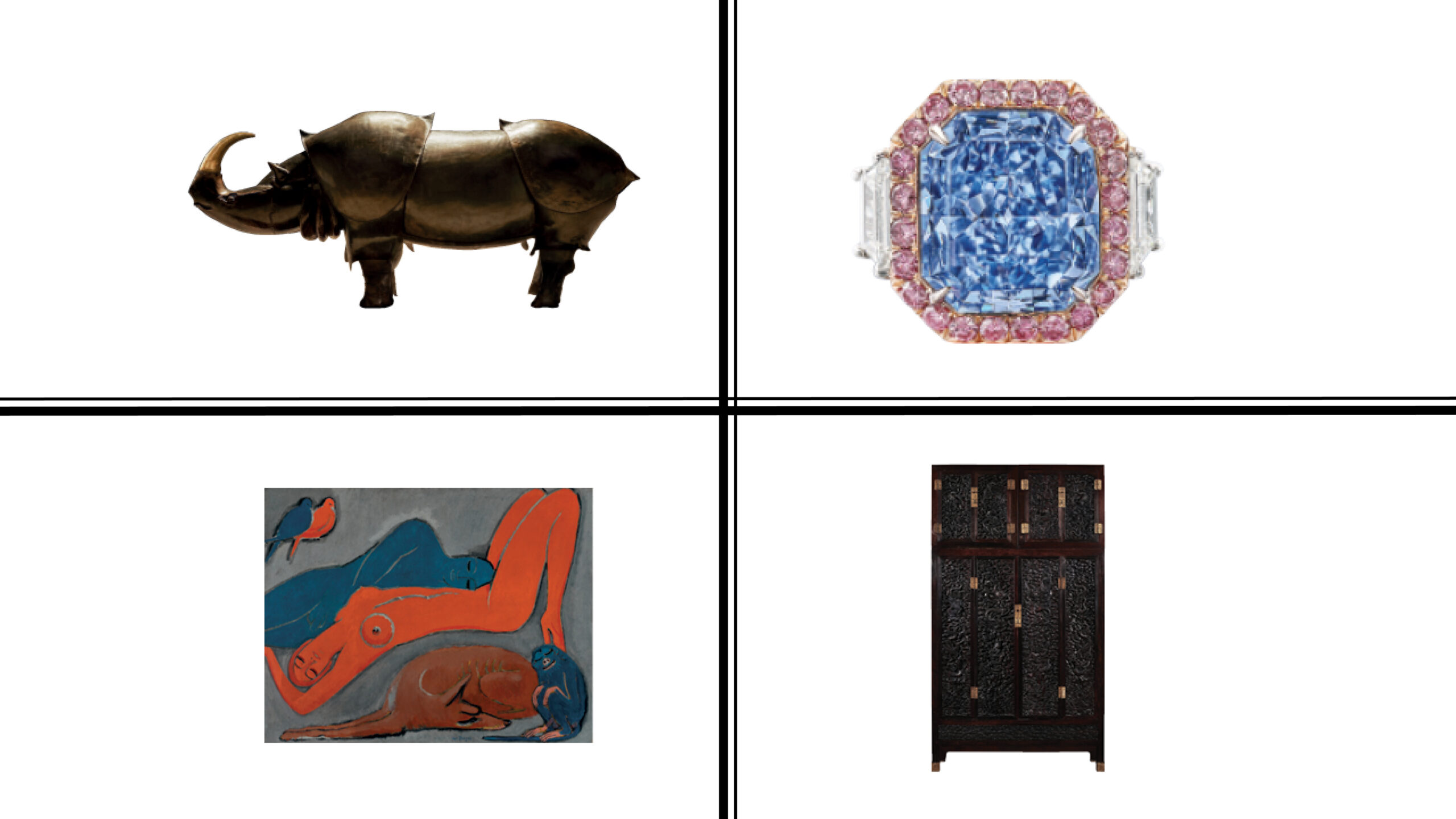Four items that particularly stood out at this season’s auctions include an 11.28-carat fancy vivid blue diamond ring, a zitan ‘dragon’ compound cabinet, Sam Josefowitz’s masterpiece and Francois-Xavier Lalanne’s art. See how each attracted ground-breaking bids.
Brilliant Blue
Infinitely irresistible diamond ring

A superb 11.28-carat radiant-cut fancy vivid blue diamond set the auction house buzzing with its dazzling elegance, notching up one of the highest prices ever achieved for a diamond in Asia. The prized lot at Sotheby’s Hong Kong 50th Anniversary Autumn Sales fetched HK$198.2 million (US$25.3 million), with the house securing the three best-ever sales prices in Asia for blue diamonds – this one coming in third.
Praise for The Infinite Blue diamond, mounted in a diamond ring with brilliant-cut white and pink-tinged diamonds, was effusive, with Wenhao Yu, Chairman of Jewellery and Watches at Sotheby’s Asia, commenting: “[Its] beautiful blue hue, elegant cut and unique physical properties make it one of the most irresistible diamonds to appear on the market. It’s been an honour to have been entrusted with the opportunity to offer a diamond of such breathtaking beauty, its price attesting to the resilient demand for top-quality coloured diamonds amongst global collectors.”
Undoubtedly, part of the appeal of this magnificent diamond stems from its rarity, with less than 0.1% of diamonds sourced exhibiting a high-grade blue.
Household of the Blue Dragon
Emperor’s cabinet commands sky-high price

A massive zitan ‘dragon’ compound cabinet likely used by the Kangxi Emperor (1654-1722) attracted a dramatic two- way bidding war between a collector on the phone and an admiring fan at Sotheby’s auction house in Hong Kong. This superb example of early Imperial Qing furniture, which stands at a massive 3.7 metres high, finally went for HK$54.6 million (US$7 million).
The cabinet is infused with imagery carved into the silky zitan wood that adds to its allure. Dragons soar through the clouds in a display of symbolism that had deep meaning at the time, signifying imperial presence and power. Such is the quality of the workmanship displayed on the cabinet that only the most skilled artisans from one of the palace workshops under the command of the emperor’s household would have been tasked with the job.
Another reason for the impressive price – and the ferocious bidding – is that this sale represents the first time since at least the early 1940s that all components of the cabinet have been sold as one unit. The top left- and right-hand compartments had earlier been separated from the main body of this majestic piece and possibly passed inside the members of the same French family.
Quiet Reverie
Fauvist sensual embrace woos collectors

A strikingly colourful masterpiece from the art collection of the late tycoon Sam Josefowitz caught the eye at Christie’s auction house in London. Following frenzied bidding, the final price of Kees van Dongen’s La Quiétude was inflated to an astonishing £10.78 million (HK$102.3 million). This represented over twice the higher end of the estimate, such was the interest amongst enthralled onlookers in this oil on canvas laid down in 1918.
La Quiétude hit the block during Christie’s evening sales of 20th and 21st-century art in London, part of contemporary art fair Frieze Week. Typical of the Dutch-French artist’s Fauvist use of colour, the work was influenced by a 1913 visit to Egypt, where Van Dongen travelled down the Nile to Luxor and was struck by a sculpture of Ramesses II. Orientalism was in vogue, and the imagery of curvaceous bodies locked in perfect harmony draws on the erotism evoked in the Western mind at this time by the culture and civilisation of North Africa and the Middle East.
Dongen developed a great admiration for fashion designer Paul Poiret, who acquired La Quiétude direclty from Dongen.
Rare Beast
Lalanne sculpture smashes records

François-Xavier Lalanne’s masterpiece, Rhinocrétaire I, broke the world auction record for the artist at a recent sale by Christie’s in Paris. The eventual price of the almost life-size rhino sculpture-cum-functional furniture rose to €18.3 million (about HK$151 million), doubling the previous sum paid for a work by the artist.
François-Xavier Lalanne first exhibited this 1964 sculptural work in the presence of his partner and fellow artist, Claude Lalanne, at an exhibition called Zoophites. Made of patinated brass and bronze, zinc, brass, silvered brass, leather and natural wax, Rhinocrétaire I was considered by many as the standout item on display. Part of its charm is a homage to the fondness in 18th-century France for discreet drawers and hiding places. For instance, the beast’s hand-welded brass flanks contain a hidden safe as well as an illuminated desk.
Such was the enormity of the sale that the auctioneer, Cécile Verdier, Chairman of Christie’s France, commented: “A historic moment in Paris for this unique piece, which establishes François- Xavier Lalanne as one of the great sculptors of the second half of the 20th century.”



